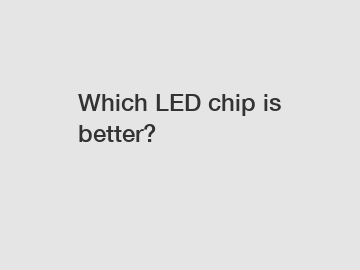Which LED chip is better?
Which LED chip is better? Hot topics in the world of light-emitting diodes.
LEDs, or light-emitting diodes, have revolutionized the world of lighting with their energy efficiency, long lifespan, and versatility. LED technology offers a wide range of uses, from household lighting to automotive applications, and even large-scale displays. However, when it comes to LEDs, one of the most important considerations is the type of LED chip used. With various options available, it begs the question: Which LED chip is better?
To delve deeper into this topic, let's explore the strengths and weaknesses of two popular LED chip options: the Organic Light-Emitting Diode (OLED) chip and the Inorganic Light-Emitting Diode (ILED) chip.

I. OLED Chip - Aesthetic Appeal and Flexibility.
1. Display Quality: OLED chips are renowned for their exceptional display quality. With the ability to emit light directly from the organic materials, OLED displays offer vivid colors, high contrast ratios, and wider viewing angles. This makes them ideal for applications that require stunning visuals such as televisions, smartphones, and electronic billboards.
2. Flexibility: Unlike traditional LEDs or ILEDs, OLED chips are incredibly flexible. This flexibility opens up new possibilities in design, enabling manufacturers to create curved displays or even rollable screens. The thin and lightweight nature of OLED chips also allows for innovative applications such as wearable technology or flexible lighting installations.
3. Lifespan and Efficiency: While OLED chips have made considerable progress in recent years, their lifespan is still generally shorter compared to ILED chips. The organic materials used in OLED chips tend to degrade over time, affecting their longevity. Additionally, OLED displays can be less energy-efficient compared to ILEDs, making them less ideal for applications where power consumption is a concern.
II. ILED Chip - Energy Efficiency and Durability.
1. Energy Efficiency: When it comes to energy efficiency, ILED chips shine. These inorganic LED chips convert electrical energy into light with minimal wastage, making them extremely efficient. With growing concerns about energy conservation, ILED chips have become a popular choice for applications that prioritize energy savings, such as general lighting in homes and commercial buildings.
2. Durability: ILED chips boast a longer lifespan compared to OLED chips. The absence of organic materials in ILED chips ensures better resistance to degradation, leading to a longer operational life. This durability makes ILEDs highly suitable for applications that require long-lasting lighting solutions such as streetlights, outdoor signage, or automotive lighting.
3. Manufacturing Cost: In terms of manufacturing cost, ILED chips typically have an advantage over OLED chips. Due to the simpler manufacturing process and the widespread production scale, ILED chips tend to be more cost-effective. This factor makes ILEDs more accessible for general lighting applications, where cost plays a significant role.
In conclusion, when considering the question of which LED chip is better, it ultimately depends on the specific application requirements. OLED chips offer superior display quality and flexibility, making them a preferred choice for devices that demand captivating visuals. On the other hand, ILED chips excel in energy efficiency, durability, and cost-effectiveness, making them the preferred choice for general lighting applications.
As LED technology continues to evolve, it is essential to assess the advantages and drawbacks of each type of LED chip to make an informed decision. Both OLED and ILED chips have made significant advancements, pushing the boundaries of lighting possibilities. Ultimately, the choice between the two types of LED chips lies in the hands of manufacturers and consumers, who must carefully consider their specific needs and goals.
Are you interested in learning more about 600w cob led, 300 watt cob led, led cob chip 100w? Contact us today to secure an expert consultation!


